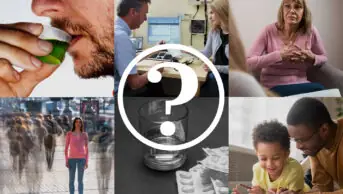
Shutterstock
Most antidepressants prescribed for children and adolescents with major and acute depressive disorders are ineffective, according to research published in The Lancet
[1]
(online, 8 June 2016).
Following a meta-analysis of data from 34 trials including 5,260 patients, researchers concluded that only fluoxetine was more effective than placebo in relieving symptoms in these young patients.
“Antidepressants in the acute treatment of major depressive disorder… do not seem to offer a clear advantage for children and adolescents,” say the researchers, led by Andrea Cipriani, department of psychiatry, University of Oxford, and Xinyu Zhou, department of neurology and psychiatry, the First Affiliated Hospital of Chongqing Medical University, China.
“Fluoxetine is probably the best option to consider when a pharmacological treatment is indicated,” they conclude.
The researchers carried out the review to identify both direct and indirect evidence from relevant trials. They also looked at data – both unpublished and published – from international clinical trial registers to discover the impact of the drugs on symptoms and how well they were tolerated.
The 14 antidepressants considered were: amitriptyline, citalopram, clomipramine, desipramine, duloxetine, escitalopram, fluoxetine, imipramine, mirtazapine, nefazodone, nortriptyline, paroxetine, sertraline, and venlafaxine.
But the researchers warn that the quality of the evidence was “very low” and poor study design makes it difficult to give a true and confident picture about the effectiveness and potential harm of these drugs for children and young people.
“We cannot rule out the possibility that some unpublished studies are still missing or that published reports might overestimate the efficacy of treatments,” they say. “Moreover, poor methodology, risk of bias within individual studies, and potential selective reporting are important factors to be considered when interpreting the results from this meta-analysis.”
The team concludes that only fluoxetine was more effective than placebo, in terms of mean overall change in depressive symptoms (standardised mean difference – 0.51, 95% credible interval [CrI] – 0.99 to 0.03). Fluoxetine was also better tolerated than duloxetine (odds ratio [OR] 0.31, 95% CrI 0.13 to 0.95) and imipramine (OR 0.23, 95% Crl 0.04 to 0.78).
Treatment with imipramine, venlafaxine and duloxetine was discontinued because of adverse effects more often compared with those patients given placebo (OR 5.49, 95% CrI 1.96 to 20.86; OR 3.19, 95% CrI 1.01 to 18.70; and OR 2.80, 95% CrI 1.20 to 9.42, respectively).
In an accompanying comment piece[2]
, Jon Jureidini, from the Critical and Ethical Mental Health research group at the Robinson Research Institute at the University of Adelaide, Australia, says the findings reinforce the need for independent researchers to be given access to individual patient level data in order to inform their research.
“[The researchers] report that they could not be confident in the accuracy of published information used for their analysis because they were unable to access individual patient-level data. This is a shocking conclusion that appears to be applicable to all pharmaceutical research reports, including unpublished clinical study reports,” he says. “Patients who take part in randomised controlled trials have a right to expect that maximum benefit will come from the data they generate.”
Jureidini adds that the effect of misreporting is that antidepressants, possibly including fluoxetine, are likely to be more dangerous and less effective treatments than has been previously recognised. “There is little reason to think that any antidepressant is better than nothing for young people,” Jureidini concludes.
Katherine Delargy, deputy chief pharmacist at Barnet, Enfield and Haringey mental health NHS Trust, described the meta-analysis results as “important” but asks for more research to be carried out.
“We know that all antidepressants should be intensively monitored, especially in the period around stopping and starting an antidepressant,” she comments, adding that it has long been the case that the risk of suicide has not been comprehensively assessed for all antidepressant drugs.
“We would like to see more trials — perhaps fewer funded by pharma — where both efficacy and tolerability can be examined in children and adolescents. We need pharma to be open about negative findings in their trials, so that we can assess the evidence in a balanced manner.”
Steve Bazire, former chief pharmacist at Norfolk and Waveney Mental Healthcare Partnership NHS Trust, questions some of the reviewers’ conclusions: “The paper doesn’t necessarily show that antidepressants don’t work, just that we can’t prove or disprove it yet as the evidence was classed as very low quality.”
He also queries the researchers’ suggestion that the first choice for adolescent depression should be “evidence-based psychotherapy”.
“The evidence for that is even worse,” argues Bazire, pointing out that trials examining the efficacy of psychological interventions often rely on the use of “waiting list control groups”, comparing the effects of the intervention with the effects of doing nothing.
“Telling someone with depression ‘we know you’re ill but we are not going to treat you for 16 weeks’ is effectively abandoning them, possibly the worst thing you can do. So of course the intervention appears effective – how is that a better evidence base?”
Bazire points out that previous research that directly compared drugs with cognitive behavioural therapy (CBT) showed that drug therapy is more effective. “So if antidepressants don’t work, neither does CBT,” he says.
However, he acknowledges the dangers of antidepressant use and says they must be used with caution, starting with low doses and slowly increasing the dose to avoid any akathisia or heightened anxiety. “Patients must also be monitored for akathisia linked with suicide,” he adds.
References
[1] Cipriani A, Zhou X, Del Giovane C et al. Comparative efficacy and tolerability of antidepressants for major depressive disorder in children and adolescents: a network meta-analysis. The Lancet 2016. doi: 10.1016/S0140-6736(16)30385-3
[2] Jureidini J. Antidepressants fail, but no cause for therapeutic gloom. The Lancet 2016. doi: 10.1016/S0140-6736(16)30585-2


